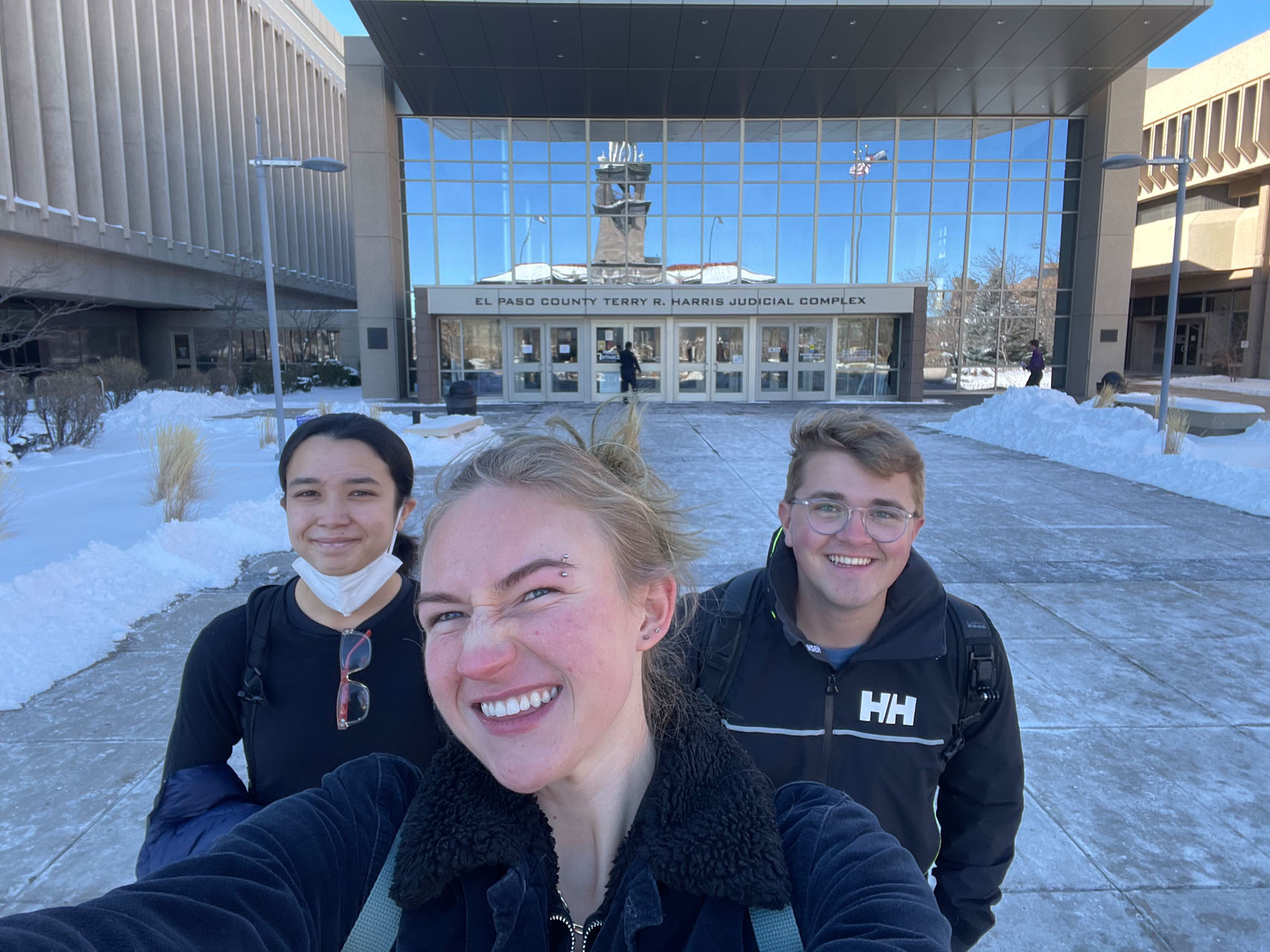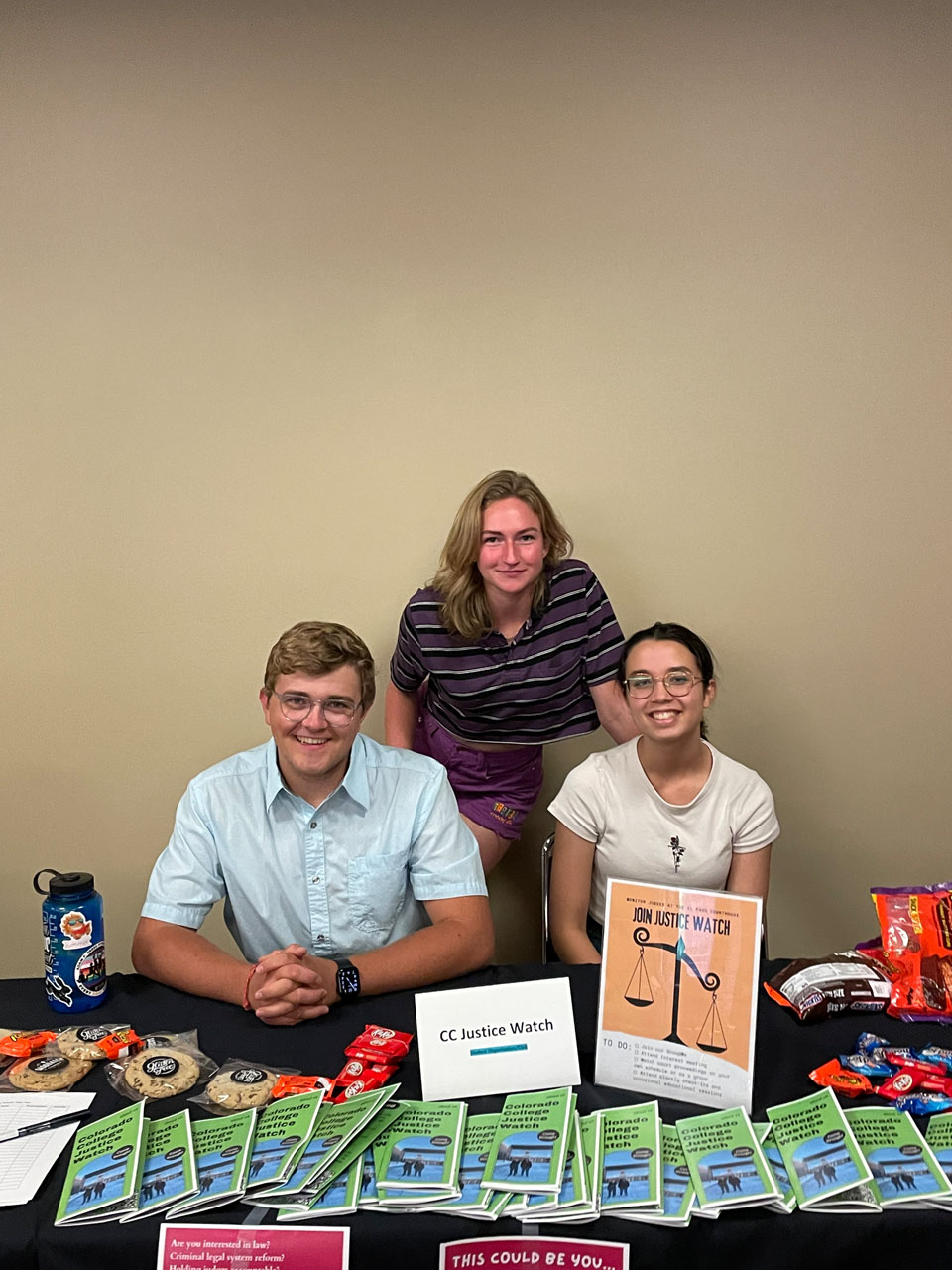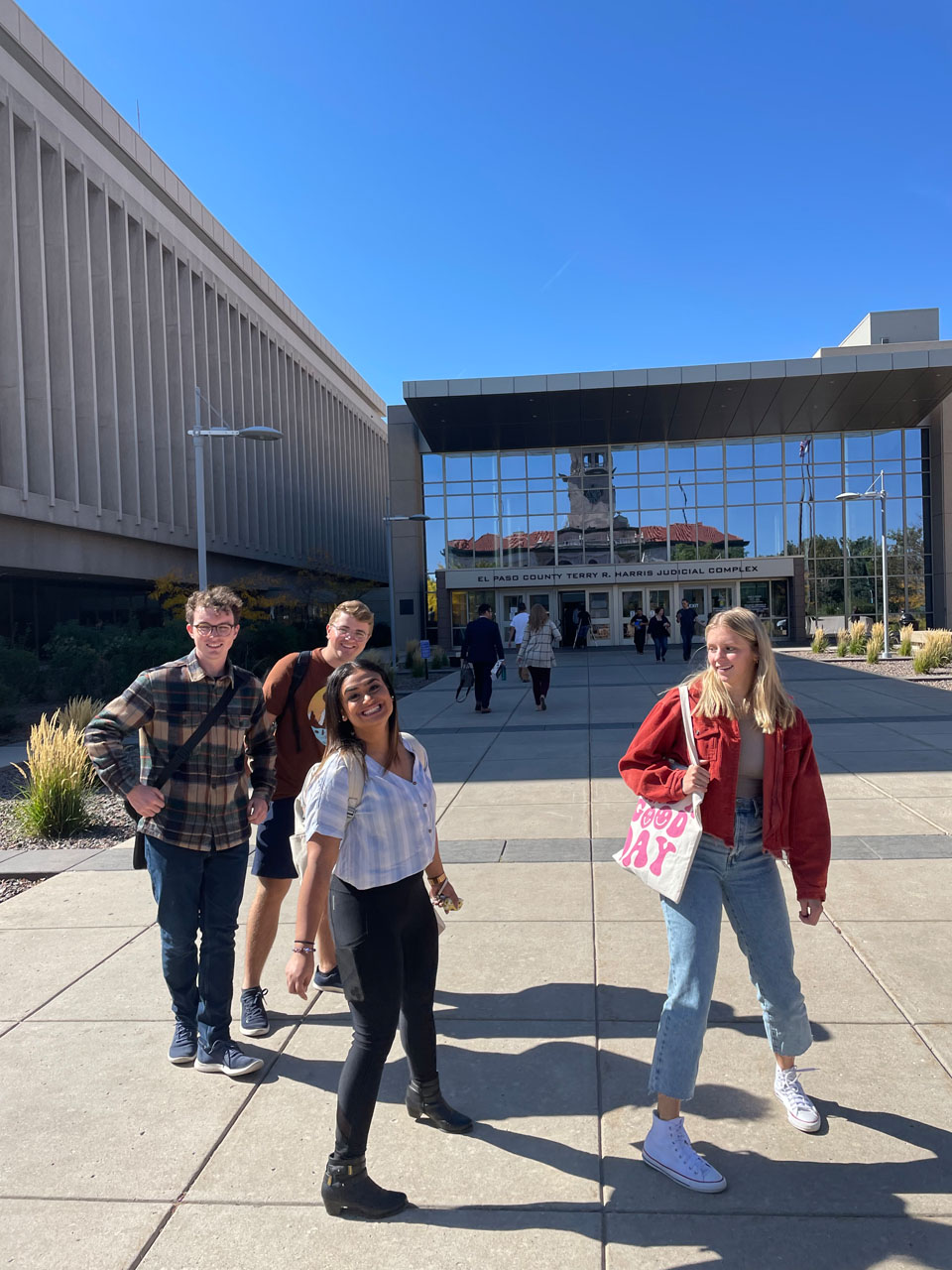Students in the Justice Watch club participate in court watching, where they sit in on sessions in the El Paso County Courthouse, to help keep judges accountable and aid the public’s understanding of what judges in their community are doing.
One of the club’s primary goals is to increase fairness in the judicial system. “Some of us come from a prison abolition angle and see this work as a stepping stone, while others don't contest the validity of the court system but want to keep judges accountable to the community,” says Emma Fowkes ’24, co-chair of the club.
“We think court watching is important in itself in that it lets judges know that their actions do not go unnoticed by the community, but we also use these observations for reports and voter education,” says Fowkes, a sociology major.
“I chose to become a co-chair of Justice Watch because there is a lot wrong with the court system and its treatment of individuals,” says Koray Gates ’25, co-chair of the club.
This semester, Gates and Fowkes are tackling two major projects as a club; a legislative report card and collecting data to determine racial biases in bond hearings.
The club will help with the creation of a legislative report card in collaboration with Citizen's Project, a local nonprofit organization. The goal of this report card is to provide voters with useful and objective information about judges in retention elections. “The project is a large undertaking, but we are working closely with Citizen's Project to ensure that it is completed by the next elections in the fall of 2024,” says Gates.
To complete this report card, Justice Watch members will work with the Citizen’s Project to use court watching data collected by the club, as well as historical court data obtained through Freedom of Information Act (FOIA) requests, that club members will analyze with guidance and help from the Citizen’s Project. “Our goal is to provide a comprehensive picture of a judge's record in the courtroom, taking into consideration their performance, decisions, and any other relevant information. This report card will serve as a valuable resource for voters, helping them make informed decisions when they vote to retain judges,” says Gates.
The second project of the semester was brought to Gates and Fowkes by a magistrate at the El Paso County Courthouse who is part of the courthouse's Equity Task Force. The magistrate asked Gates and Fowkes to have the club observe her bond hearings and collect data to see if there are any racial biases in the bond assignments.
“This project is significant as it sheds light on a very important issue in the judicial system, and the data collected will be used to advocate for fairness and equity in the bond hearing process,” says Gates, a political science major and journalism minor.
The Justice Watch club helps advance CC’s commitment to antiracism in several ways.
“The criminal justice system has been and remains a system that is deeply racist. Justice Watch advances CC’s commitment by working to increase transparency and give the public a greater role in who gets to work in a system that determines the fates of members in our society. Our goal is to dismantle white supremacist structures and democratize the system,” says Fowkes and Gates.
The club’s work involves monitoring proceedings, collecting and organizing data, and increasing accountability through relationships with the courthouse and voter guides. “Our objective is to make judge's decisions and behavior more public and help give the public a say in which judges stay in their position,” says Fowkes.
Fowkes got connected to the club through the Criminal Justice Coalition part of the Collaborative for Community Engagement (CCE). She is interested in going into nonprofit prison abolition work and law, so the club fits her interests and passions.
Gates first learned about Justice Watch during his first semester on campus, when the CCE asked if anyone was interested in restarting the club, which had not been around for many years. Gates and Fowkes were both interested, so they met with Gail Murphy-Geiss, professor and chair of the Sociology Department, to learn more about the club and what it entails. Neither Gates nor Fowkes had run a club before, and Gates had never been inside a courtroom, so both students went to the courthouse several times before officially starting the club.
Prior to becoming a club on campus, Justice Watch was a community organization, and Murphy-Geiss was involved with it from the beginning. When the other volunteers moved to different issues, Murphy-Geiss had students in her classes go to court to continue collecting data. However, a few blocks a year is not enough to get robust data, so Murphy-Geiss encouraged students on campus to establish the club.
Murphy-Geiss was the faculty advisor last year, but now she is an informal resource for the club, and Sarah Elsey, student engagement coordinator in the CCE, is the club’s official staff advisor.
“The leaders of Justice Watch have been diligently working to establish priorities for this semester and we are very proud of their work,” says Elsey, who added that the CCE supports 15 student organizations on campus that are engaging with a partner organization in the broader Colorado Springs community.
Isabelle Wangevoord ’25, former co-chair, Fowkes, and Gates began recruiting members for Justice Watch in Spring 2022. They held a few meetings but did not have any luck getting students to attend court watching trips. Fowkes and Gates led the first court watching trip this past fall and have had more consistent member engagement since then.
“Citizens should know what’s going on the courts – they are our courts. But few people have the time or energy to go. CC students are well placed to take the time and provide the service while also learning about the justice system here and experience a bit of the Springs, outside the CC bubble,” says Murphy-Geiss.
Club members are sometimes questioned about why they are inside the courtroom, but once they explain that they are students participating in a court watching organization, everyone is usually satisfied. Some club members have had some more thorough and interesting conversations about their work with public defenders, prosecutors, and judges outside of the courtroom. “We've never had anyone act hostile or annoyed at us. In fact, everyone has been quite encouraging and welcoming,” says Fowkes.
Watching a court case was a positive experience for Emma Jones ’26, who joined last semester and plans to remain active in the club throughout her time at CC. “The attorneys handed us business cards and were aware and open to us observing them. It made me feel like change is capable within the judicial system here in Colorado Springs,” says Jones, a political science major.
Members are encouraged to go to the courthouse as frequently or as infrequently as they want. “Court watching is very flexible because there are so many court cases, even with just the judges that we are focusing on who are coming up for retention in 2024, so students can go whenever it fits into their schedule,” says Gates.
There are about 20 to 25 active members who consistently attend meetings and have taken part in court watching. However, the club also works on projects that require other kinds of work, such as submitting FOIA requests, so members who aren’t interested in going to the courthouse are able to participate in the club in other ways.
Gates and Fowkes alternate weeks taking a group of members to the courthouse to all sit together. “These have been great because it gives people the opportunity to go with others which makes it more fun and gives an easy option to go court watching. Also, going into a courthouse and into a courtroom can be intimidating so it helps alleviate some anxieties,” says Gates.
While many members join the work from a progressive critique of the criminal justice system, Fowkes says that the club is not tied to a particular party or platform.
The club is open to all Colorado College students, and no prior knowledge of the court system is required. The club also hopes to bring in guest speakers throughout the semester, such as judges, previously incarcerated people, and public defenders.
Interested students should contact Emma Fowkes or Koray Gates.








